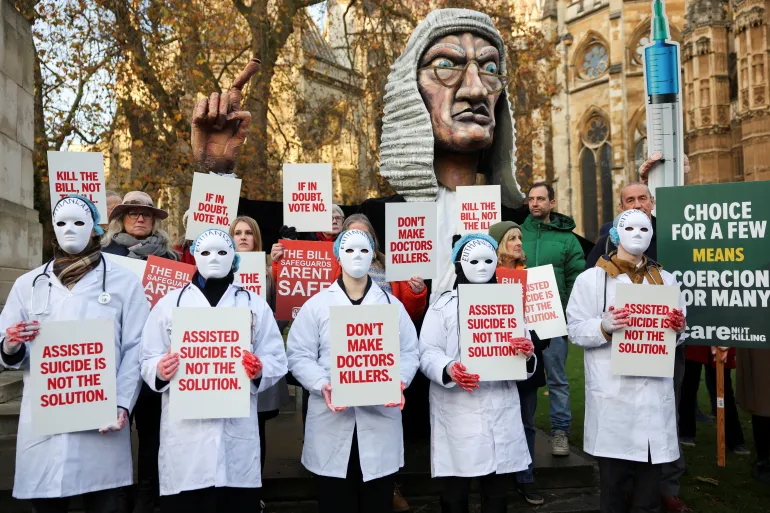Majority of Welsh MPs back legal right to end life for terminally ill patients
A GROUNDBREAKING law to legalise assisted dying for terminally ill adults has been approved by MPs, setting England and Wales on course to join a growing number of countries that allow people to end their lives with medical support under strictly controlled conditions.
Following an emotional and closely fought debate, the House of Commons passed the Assisted Dying Bill by 314 votes to 291 on Friday (June 20), a majority of 23. The bill was introduced by Labour MP Kim Leadbeater, who described the vote as “a compassionate and necessary change.”
The legislation will now be debated in the House of Lords, where it is expected to receive further scrutiny but not be blocked. If passed, it could receive royal assent by the end of the year, although it will not come into effect for up to four years.
Clear support from Welsh MPs
Wales played a key role in pushing the bill through, with 24 of the nation’s 32 MPs voting in favour, seven voting against, and one absent.
Among those backing the legislation was Henry Tufnell, Labour MP for Mid and South Pembrokeshire, who had previously pledged to support assisted dying if safeguards were robust.
Speaking after the vote, Mr Tufnell said:
“This was not an easy decision, but it was the right one. I believe it is possible to offer people dignity and choice at the end of life while still protecting the vulnerable.”
Other supporters included Labour MPs David Burton-Sampson, Siobhain McDonagh, Stephen Kinnock, Carolyn Harris, and Plaid Cymru’s Ben Lake. Only a small number of Welsh MPs opposed the bill, including Labour’s Diane Abbott and several Conservative backbenchers.
What the bill proposes
Under the terms of the new law, adults in England and Wales with a terminal illness and a life expectancy of less than six months will be eligible to request an assisted death if:
- They are aged 18 or over and a UK resident
- They are of sound mind and acting voluntarily
- They receive approval from two independent doctors
- A separate panel—including a lawyer, psychiatrist and social worker—confirms eligibility
Patients would be required to self-administer the life-ending medication. The law includes criminal penalties for anyone found to have coerced a person into choosing death.
Emotional stories sway opinion
Many MPs described the debate as one of the most emotionally intense in modern times. Personal stories of loved ones suffering in pain and without dignity were shared across party lines.
Labour’s David Burton-Sampson, initially opposed due to his Christian beliefs, said:
“This is not about promoting death. It’s about offering choice when the end is near and the pain is too great.”
Others, such as Conservative MP Mark Garnier, compared harrowing UK experiences with those of constituents who travelled to countries like Switzerland or Spain, where assisted dying is already legal.
But not all were convinced. Some MPs raised serious concerns about the potential for abuse, the message it sends to disabled people, and the strain on palliative care services.
Disabled voices protest
Outside Parliament, disability rights groups staged a demonstration, warning that the bill could place pressure on vulnerable individuals to consider death if they feel like a burden.
Labour MP Vicky Foxcroft, who voted against the bill, said:
“Disabled people across Wales and the UK want better support to live—not a law that helps them die.”
Former Chief Nursing Officer and now Bishop of London, Sarah Mullally, also raised concerns, warning:
“This bill risks introducing a service in a society that already fails many of its most vulnerable.”
Wales and the world
If passed in full, the law will place England and Wales among a growing list of jurisdictions that allow assisted dying under strict conditions—including Canada, the Netherlands, Belgium, New Zealand, and parts of the US and Australia.
Supporters argue the UK is finally catching up with international standards of compassionate care. Opponents fear it represents a dangerous moral shift in the role of the state.
Implementation and unanswered questions
Even if it receives royal assent this year, the law will not take effect immediately. The government has said it will take up to four years to set up the system and ensure safeguards are in place.
There are still open questions about:
- Whether the NHS or private providers will administer the service
- Whether it will be free at the point of use
- How it will be offered in rural or Welsh-speaking communities
The Health Secretary has been ordered to produce a full report on the state of palliative care across the UK as part of the transition.
Looking ahead
Dame Esther Rantzen, who has terminal lung cancer and has been one of the most prominent campaigners for change, welcomed the result.
“I never thought I would live to see this moment. It may come too late for me, but it brings hope to so many others.”
Labour peer Lord Falconer will now guide the bill through the Lords, with support from Conservative peers including former Scottish Secretary Alister Jack.
If passed, the UK would take its first steps into a legal, regulated framework for assisted dying—one that many see as a matter of dignity and personal freedom, and others as a dangerous threshold that society should never cross.













